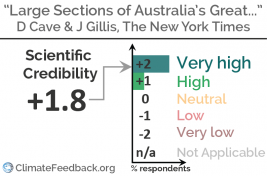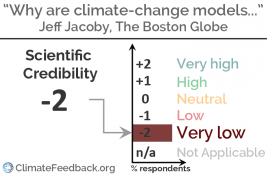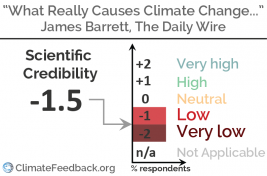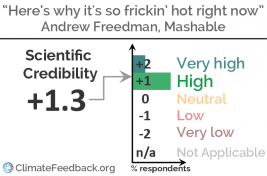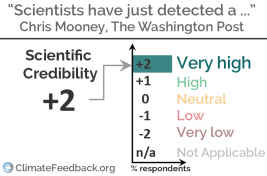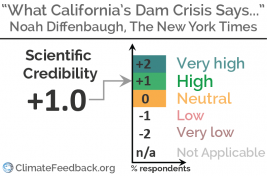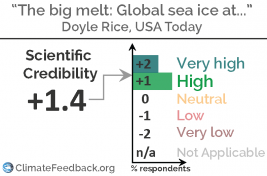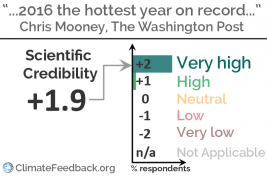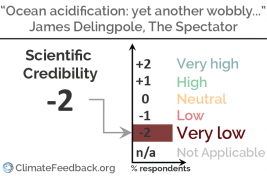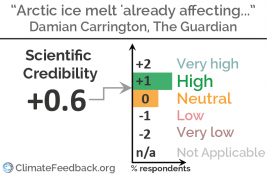Article Reviews
“Is this article consistent with the latest thinking and knowledge in science?”
“Would experts in this field endorse the main message of this article?”
These are the types of questions our “feedbacks” are designed to answer. If the feedback is positive, you can generally assume the information you’re reading is of high credibility. If it’s negative, however, you may want to read with extra care and attention — some of the information contained and conclusions reached are not consistent with science.[1]
Analysis of “Large Sections of Australia’s Great Reef Are Now Dead, Scientists Find”
in The New York Times, by Justin Gillis & Damien Cave
While natural temperature fluctuations (due to El Niño, for example) have always occurred, they are now superimposed on a warmer background due to human-induced global warming. That causes mass coral bleaching to happen more frequently.
— 18 Mar 2017
Analysis of “Why are climate-change models so flawed? Because climate science is so incomplete”
in The Boston Globe, by Jeff Jacoby
"The facts given by the author regarding the skills of climate models and the state of the art are mostly wrong. The most important processes are not understood by the author and his logic is flawed."
— 16 Mar 2017
Analysis of “Scientists: Here’s What Really Causes Climate Change (And It Has Nothing To Do With Human Beings)”
in The Daily Wire, by James Barrett
"The article misuses a Nature article on a geological process 90 millions years ago to argue the warming of the past century is not anthropogenic. It seems the reasoning is ideologically motivated rather than based on reality."
— 28 Feb 2017
Analysis of “Here’s why it’s so frickin’ hot right now”
in Mashable, by Andrew Freedman
"a nice summary of the current warm events in the bigger context of climate change. I caution against using a single month of data to support claims about climate change impacts on extremes, but the discussion about record highs outpacing record lows is a good one and provides strong evidence for influence of global warming on regional weather."
— 28 Feb 2017
Analysis of “Scientists have just detected a major change to the Earth’s oceans linked to a warming climate”
in The Washington Post, by Chris Mooney
"Changes in ocean chemistry, temperature, and circulation have significant consequences for marine life and can initiate positive feedbacks to accelerate ocean and atmosphere warming. This article is refreshing in that the author presents the results and significance of global ocean oxygen loss accurately and very clearly for non-expert audiences."
— 19 Feb 2017
Analysis of “What California’s Dam Crisis Says About the Changing Climate”
in The New York Times, by Noah Diffenbaugh
Warm dry years followed by extremely wet years have always been part of the climate of California, but warming can worsen both extremes by increasing evaporation, which makes droughts worse as well as put more moisture into the atmosphere allowing heavier downpours.
— 16 Feb 2017
Analysis of “The big melt: Global sea ice at record low”
in USA Today, by Doyle Rice
The five scientists who reviewed the article concluded that it is accurate. It properly conveys the core facts about global sea ice extent and the attribution of continuing sea ice loss to human-induced warming of the climate—primarily in the Arctic, as the low sea ice extent around Antarctica this year has not yet been clearly connected to climate change.
— 10 Feb 2017
Analysis of “U.S. scientists officially declare 2016 the hottest year on record. That makes three in a row.”
in The Washington Post, by Chris Mooney
"The article accurately conveys the US agencies' declaration of 2016 as the hottest year on record. It provides some good background material on why the agencies' numbers differ slightly (treatment of the Arctic) and the contributing roles of El Niño and man-made global warming."
— 19 Jan 2017
Analysis of “Ocean acidification: yet another wobbly pillar of climate alarmism”
in The Spectator, by James Delingpole
The scientists who have analyzed the article show that it contains significant inaccuracies, notably for its core assumptions, and misrepresents scientific studies and scientists it cites to make its point. Reviewers also note that the article knocks down strawman arguments that do not represent the state of scientific knowledge (scientists do not claim the ocean will become a “giant acid bath”).
— 10 Jan 2017
Analysis of “Arctic ice melt ‘already affecting weather patterns where you live right now'”
in The Guardian, by Damian Carrington
"The article nicely introduces some of the emerging science linking Arctic climate change to extreme weather at lower latitudes. There are no major inaccuracies and the author has sought expert comment form several prominent scientists. However, the article fails to fully capture the large uncertainty about how Arctic warming may influence weather in places further south and how big this effect might be."
— 21 Dec 2016
[1] Note: These feedbacks do not constitute endorsements of the author’s political or economic ideology, rather they are assessments of the scientific foundations and reasoning of the argumentation contained within each article.

